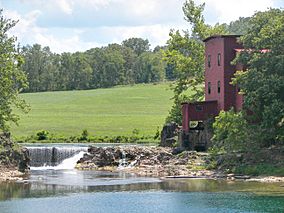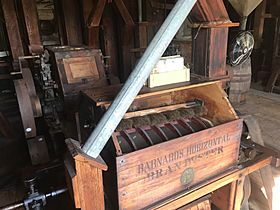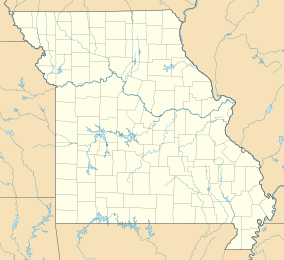Dillard Mill State Historic Site facts for kids
Quick facts for kids Dillard Mill State Historic Site |
|
|---|---|
 |
|
| Location | Crawford County, Missouri, United States |
| Area | 131.77 acres (53.33 ha) |
| Elevation | 906 ft (276 m) |
| Established | 1977 |
| Visitors | 23,331 (in 2022) |
| Governing body | Missouri Department of Natural Resources |
| Website | Dillard Mill State Historic Site |
|
Dillard Mill Historic District
|
|

The mill's still working
Barnard's Horizontal Bran Duster |
|
| Location | 142 Dillard Mill Rd., near Davisville, Missouri |
| Area | 58 acres (23 ha) |
| Built by | Adams, Jacob; Mischke, Emil; Klemme, Lester |
| Architectural style | I-house, Bungalow |
| NRHP reference No. | 14001157 |
| Added to NRHP | January 14, 2015 |
The Dillard Mill State Historic Site is a special place in Crawford County, Missouri. It's managed by the state and keeps an old water-powered gristmill safe. This mill sits right on Huzzah Creek.
The site covers about 132 acres. That's like 100 football fields! The Missouri Department of Natural Resources has managed it as a state historic site since 1975. They rent the land from the L-A-D Foundation. In 2015, the site was recognized as an important historic place. It was added to the National Register of Historic Places.
Contents
The Story of Dillard Mill
Early Mills on Huzzah Creek
The first mill here was built in 1853 by Francis Wisdom. People called it the Wisdom Mill. It helped local farmers grind their grain into flour.
Sadly, a fire destroyed the Wisdom Mill in 1895. But the story of milling on Huzzah Creek didn't end there.
The Mische Mill Era
New owners took over the property. They built a brand new mill in 1908. This one was called the Mische Mill. It was more modern than the old one.
The Mische Mill used a special underwater turbine instead of a big waterwheel. The owners even changed the creek's path and the nearby hill to make the mill work better. The Mische Mill worked hard until 1956.
Becoming Dillard Mill State Historic Site
In 1975, the state of Missouri started managing the property. They renamed it Dillard Mill. It officially became a historic site in 1977.
The state worked to fix up the old mill. This restoration was finished in 1980. Today, visitors can see how a water-powered mill once worked. It's a great way to learn about history!
Images for kids
 | Stephanie Wilson |
 | Charles Bolden |
 | Ronald McNair |
 | Frederick D. Gregory |




